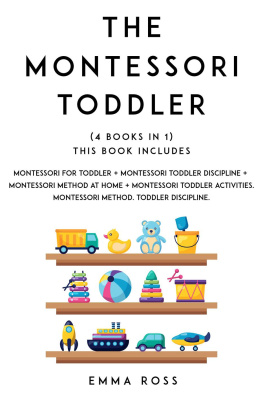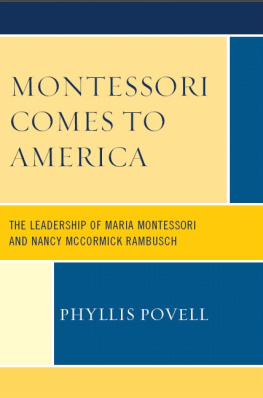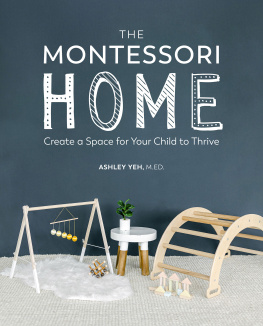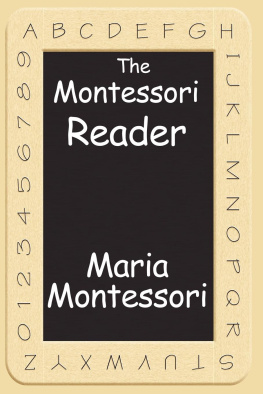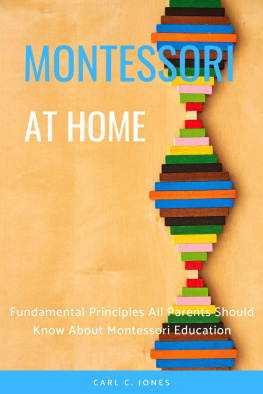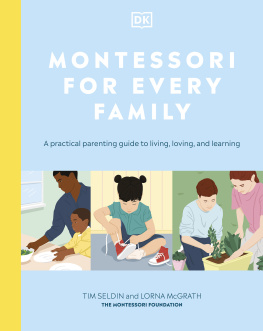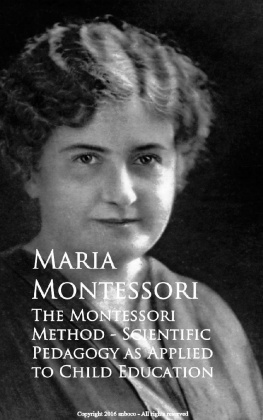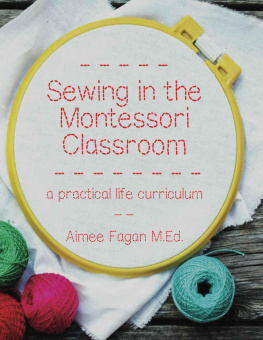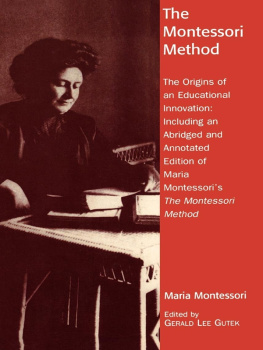Montessori Here and Now
Rosa Wood
Published by Rosa Wood, 2020.
While every precaution has been taken in the preparation of this book, the publisher assumes no responsibility for errors or omissions, or for damages resulting from the use of the information contained herein.
MONTESSORI HERE AND NOW
First edition. September 8, 2020.
Copyright 2020 Rosa Wood.
Written by Rosa Wood.
10 9 8 7 6 5 4 3 2 1
MONTESSORI
A parents guide about an alternative method to raise a responsible human being and about how to make your home made child-friendly according to the Montessori method
ROSA WOOD
Copyright 2020 Rosa Wood
All rights reserved.
ISBN:
MONTESSORI
METHOD
A parents guide about an alternative method to raise a responsible human being
ROSA WOOD
Copyright 2020 Rosa Wood
All rights reserved.
ISBN:
PREFACE
Montessori was a caring woman, who wanted to give an easy and effective way to children while educating them. She believed that if children are given a proper environment while studying then their brilliant mind can reach to the acme of success. She has designed a mechanism known as the Montessori school of Education. This book tells you the intricacies, the methods, the role of kids, teachers and parents while Montessori School of Education.
Montessori training is an alternate technique for instruction that spotlights on understudy improvement as opposed to learning. At the end of the day, it doesn't underline tests, tests or evaluations. Truth be told, it plans to make develop and socially proficient understudies. The framework was concocted by Maria Montessori around 1900 in Italy to instruct poor kids. In an investigation in the U.S., understudies following the Montessori framework performed superior to customary understudies. The greatest contrasts were in social aptitudes and conduct. There is likewise more convictions of equity and decency in Montessori Education and sincerely positive emotions. The Montessori training accepts that kids adapt best when they pick independent from anyone else what to realize. In Montessori classes today, there are youngsters from various age foundations who take an interest in different exercises. Instructors are just there to direct the kids through the exercises. In Montessori study halls, youngsters get familiar with the estimation of freedom. This makes them equipped for settling on the correct choices and looking for information independent from anyone else. Additionally, they figure out how to help and help each other which constructs an awareness of other's expectations. Tracy Yare, an educator who utilizes Montessori style at Rasmussen College says the style utilizes the kid's advantages to start learning and create at their own pace. By concentrating on numerous exercises with various paces for each kid, Montessori instruction helps construct authority, coordination and fixation aptitudes. This is a great deal of opportunity for the understudies to get their very own exercises however they are altogether performed with determined parameters. Understudies are likewise educated in a family based condition. It gives them the help and the support to look for information without anyone else's input. An ongoing report by Dr. Elliott Landon, an administrator of schools in Long Beach, clarified that improving the nature of instruction in both neighborhood and national levels is related with giving a decent pre-school training. The quantity of Montessori school in the U.S. has expanded by 33 percent since 1981. On a worldwide level, Montessori schools have opened in different areas around the globe. There are schools in Egypt, Thailand, Tanzania, Mexico and Argentina. The majority of these schools began working as of late in the twenty-first century. The schools have picked up help among displaced person networks in those creating nations. Montessori training in creating nations additionally plans to give better possibilities for burdened kids who face issues to secure fundamental conventional instruction. 1. Spotlights on Key Developmental Stages
A Montessori educational plan centers around key formative achievements in youngsters between the ages of three and five-years of age. More youthful youngsters center around sharpening enormous muscle and language abilities. Four-year-olds chip away at fine engine abilities and finishing regular exercises, for example, cooking and expressions and specialties. More seasoned preschoolers widen their learning experience to their networks, through outings and unique occasions.
Since the instructor doesn't "run" the homeroom, understudies control the exercises they do for the duration of the day. This urges kids to share and work helpfully to investigate the different stations in the Montessori study hall. Youngsters in Montessori study halls, by the very idea of the earth, figure out how to regard each other and construct a feeling of network.
Montessori preschool understudies appreciate a study hall and educational program planned around their particular needs and capacities that enables them to investigate and learn at their own pace and all alone terms. Everything in the study hall is inside reach of the kid, and furniture is measured for youngsters to sit serenely. Moreover, more seasoned kids in the class work with the more youthful ones, so coaching comes as much from peers as it does from the grown-up educators in the study hall.
While the Montessori Method enables kids to pick the exercises they need to take a shot at every day, and to what extent they will work at a particular errand, there are explicit "standard procedures" for the class that are reliably upheld by the educator and different understudies. This condition normally shows kids self-control, and it refines significant aptitudes like focus, discretion and inspiration.
All items and exercises have exact areas on the racks of a Montessori study hall. At the point when youngsters are done with a movement, they place things once again into their suitable spots. This feeling of request encourages the learning procedure, shows self-control, and takes into account a small kid's natural requirement for a deliberate domain. At the point when kids work and play in a zone that is slick and unsurprising, they can release their inventiveness and spotlight completely on the learning procedure. Educators in the Montessori study hall are "guides" that are there to encourage the learning experience, as opposed to figure out what it will resemble. Instructors lead the pack from the kids in the study hall, guarantee the guidelines are pursued, and urge understudies to perform errands at their own pace. In any case, educators don't decide the pace of the study hall that is carefully up to individual understudies, as instructors endeavor to stay as inconspicuous as would be prudent.
Since kids are permitted to pick their exercises and work at them all alone terms, inventiveness in the study hall is empowered. Kids work at errands for the delight of the work, as opposed to the final product, which enables them to concentrate more on process than result a characteristic way to innovativeness. Presentation to a wide assortment of societies additionally urges kids to expand their contemplating the world and address those ideas in an assortment of ways. Research directed by Dr. Angeline Lillard, a teacher of brain research from the University of Virginia at Charlottesville, analyzed the capacities of youngsters who have been instructed in a Montessori school. Distributed in 2006 in the diary Science, the exploration examined Montessori understudies in Wisconsin and found that five-year-olds in Montessori homerooms had higher math and perusing abilities than their partners in government funded schools. Furthermore, the investigation thought about 12-year-old Montessori and non-Montessori understudies. While math and perusing abilities seemed, by all accounts, to be more keeping pace with this age gathering, social improvement seemed, by all accounts, to be higher in Montessori understudies by this age. Understudies in the Montessori program are permitted to investigate exercises and ideas at their own pace. This normally urges kids to attempt additionally testing regions, which quickens their learning experience. Learning happens at an agreeable pace for every understudy, as opposed to delivering a similar rate on each understudy in a study hall. Perhaps the best advantage of the Montessori Method, especially during the early learning experience, is the attention on hands-on learning. The accentuation is on concrete, instead of theoretical learning, as understudies deal with exercises that show language, math, culture and commonsense life exercises. Educators urge understudies to focus on undertakings, and they dishearten understudies from interfering with each other, enabling understudies to concentrate on exercises until they are appropriately aced.


